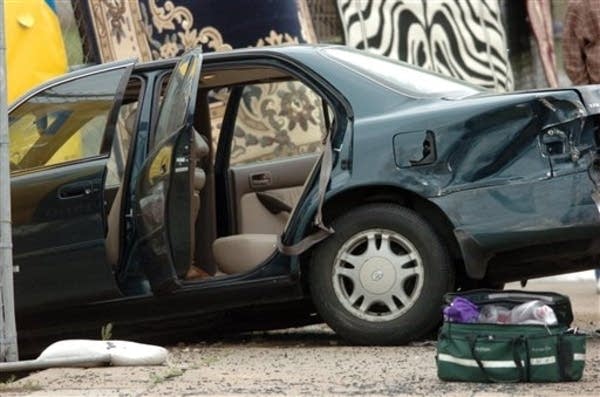Quality of defense at issue in fatal Toyota crash
Go Deeper.
Create an account or log in to save stories.
Like this?
Thanks for liking this story! We have added it to a list of your favorite stories.

A Minnesota man seeking a new trial in a fatal crash involving a Toyota might have been acquitted if his trial lawyer had properly investigated the crash and offered evidence to show his client tried to stop the car, a legal expert testified Wednesday.
But Koua Fong Lee's former attorney testified he thought the only way he could prevail was to suggest his client made a mistake, accidentally stepping on the gas instead of the brake.
Lee, 32, of St. Paul, is serving an eight-year prison sentence on criminal vehicular homicide and other charges stemming from the 2006 crash that killed three people. Lee has insisted he did everything he could to stop his car. He requested a new trial after Toyota recalled millions of vehicles because of problems with sudden unintended acceleration.
Lee's 1996 Camry wasn't part of the recall but his new attorneys say it might have experienced the same problem. Lee's attorneys say their client's original trial lawyer, Tracy Eichhorn-Hicks, did not offer evidence of possible unintended acceleration.
Turn Up Your Support
MPR News helps you turn down the noise and build shared understanding. Turn up your support for this public resource and keep trusted journalism accessible to all.
Eichhorn-Hicks, who testified as a witness for the prosecution Wednesday, said he didn't know about sudden unintended acceleration when Lee was tried in 2007, even though Lee's current attorneys contend the information was available online then.
Eichhorn-Hicks said if he had known about the issue, he would've used it as a defense.

"To me, this case never made any sense, it was like a jigsaw puzzle with one thing missing ... The sudden acceleration explains everything," Eichhorn-Hicks said.
Lee's current attorneys say he deserves a new trial because of new evidence and because Eichhorn-Hicks was ineffective. They say the jury never got to hear disputed evidence in the case.
In addition to not raising the acceleration issue, they say, Eichhorn-Hicks didn't show Lee tried to brake - even though he had a letter from an expert at Lee's insurance company saying the brake light was engaged. They also noted Eichhorn-Hicks' suggestion that Lee accidentally stepped on the gas undermined Lee's own testimony that he was braking.
Looking at all those factors, attorney Ron Meshbesher, who testified as a witness for the defense, said: "I believe the jury would've found at least a reasonable doubt and acquitted him."

Lee, a recent Hmong immigrant with only about a year of driving experience, was driving his family home from church on June 10, 2006, when their Camry zoomed up an Interstate 94 exit ramp in St. Paul. Police said it was traveling between 70 and 90 mph when it rear-ended an Oldsmobile stopped at a red light.
Javis Trice Adams, 33, and his 10-year-old son, Javis Adams Jr., died at the scene. Adams' 6-year-old niece, Devyn Bolton, was paralyzed from the neck down and died shortly after Lee was convicted. Two others were badly hurt.
Meshbesher, a well-known Minneapolis-area attorney with 53 years of legal experience, testified Wednesday that he had reviewed some documents in the case and believed Eichhorn-Hicks failed to exercise the diligence a reasonably competent attorney is expected to perform.
Meshbesher said Eichhorn-Hicks should have had experts testify about sudden unintended acceleration and offer evidence to refute testimony that the car lacked antilock brakes. An expert testified Tuesday and Wednesday that Lee's Camry did in fact have antilock brakes, but jurors weren't told that at trial, and prosecutors argued the lack of skid marks raised doubt about Lee's claim he was braking. Antilock brakes are designed to prevent wheels from locking and skidding.
"The jury had nothing to think about, really, in this case," Meshbesher said.
A prosecution witness, engineering consultant Wade Bartlett, testified later Wednesday that even a car with antilock brakes would have left some shadowy marks if a driver was trying hard to stop.
Eichhorn-Hicks said he knew Lee believed he was braking but he was facing years in prison, and he thought their best shot was to suggest Lee made a mistake and hope for a conviction on a less serious charge. Lee knew this was his strategy and had no objection, the attorney said.
Meshbesher said Eichhorn-Hicks should have gotten a waiver showing Lee agreed to that strategy. Eichhorn-Hicks said he believed that Lee, who speaks limited English and uses a Hmong interpreter in court, understood the strategy and that he didn't need a waiver because there was no disagreement. He said he would've gotten one if the court deemed it necessary.
Earlier testimony showed the court and prosecutors raised the issue of a waiver at Lee's trial, but the discussion was set aside and did not come up again.
Prosecutors argue the defense hasn't come up with the kind of decisive new evidence Minnesota law requires for a new trial. Ramsey County District Judge Joanne Smith will make a decision sometime after the hearing, which will resume Thursday morning.
(Copyright 2010 by The Associated Press. All Rights Reserved.)
Dear reader,
Political debates with family or friends can get heated. But what if there was a way to handle them better?
You can learn how to have civil political conversations with our new e-book!
Download our free e-book, Talking Sense: Have Hard Political Conversations, Better, and learn how to talk without the tension.





